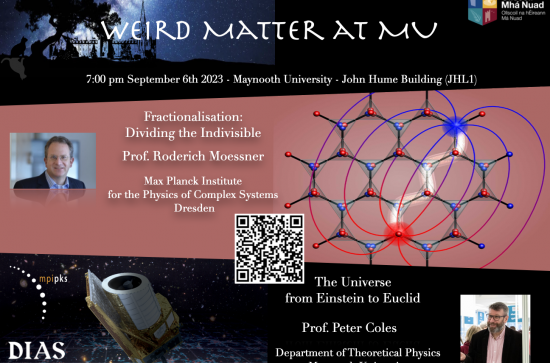
A night of science celebrating the weird and wonderful ways that matter can manifest in our universe
Maynooth University and the Dublin Institute for Advanced Studies invite you to a night of science celebrating the weird and wonderful ways matter can manifest in our universe.
In the first of two back-to-back general audience talks, Prof. Roderich Moessner (MPI-PKS and this year’s O’Raifeartaigh speaker at ITP2023) will explore the strange phenomena of fractionalisation in complex quantum systems and the remarkable ways that quantum matter can behave at low temperatures.
Our second speaker, Prof. Peter Coles (MU) will discuss our modern ideas of space and time, and how the Euclid mission will try to test whether or not they are correct by shedding light on the nature of dark matter and dark energy.
Fractionalisation: Dividing the Indivisible
Common sense states that if you only have 1 euro coins, you cannot pay 50 cents without receiving change. However, it turns out that many-body physics provides ways of going beyond such common sense, and allows us to circumvent obstacles naively thought to be insurmountable. For instance, we know how to divide apparently indivisible objects: the charge of an electron can be split into three parts; or the north and south poles of a bar magnet can be separated at will. This talk explains how this can happen, and notes some resulting deeper insights into the nature of matter, and how the natural and artificial world around us is organised.
The Universe: From Einstein to Euclid
Euclid is the name of a new scientific mission from the European Space Agency, launched on July 1st, designed to explore the composition and evolution of the Universe. The Euclid mission takes its name from the ancient Greek mathematician regarded by many as the Father of geometry. Until the last century, Euclid’s theorems were assumed not just to be mathematical notions, but to describe the geometrical structure of the physical Universe. Einstein’s general theory of relativity swept that idea aside and gave us new ways of describing space, by unifying it with time, and by allowing it to be affected by matter in a manner very different from that formulated by Euclid. Over the past century, this theory has proved to be very effective at describing the properties of the Universe as observed by modern astronomical telescopes, while also suggesting the existence of dark matter and dark energy.
The Euclid telescope will create an enormous map of the large-scale structure of the Universe across space and time by observing billions of galaxies out to 10 billion light-years, across more than a third of the sky. Euclid will explore how the Universe has expanded and how galaxies and clusters of galaxies have formed over cosmic history, and how space itself is distorted by these structures.
This talk will discuss our modern ideas of space and time, how the Euclid mission will try to test whether or not they are correct and shed light on the nature of dark matter and dark energy.
All are welcome! Tickets are free but must be reserved to avoid disappointment
Click here to book
